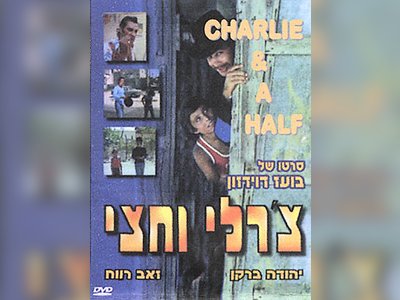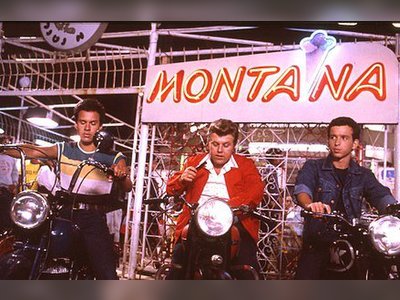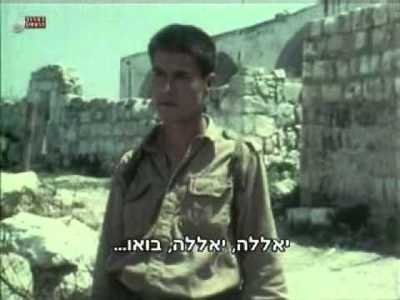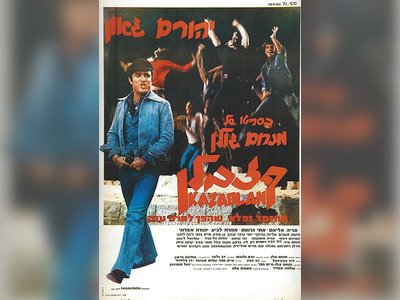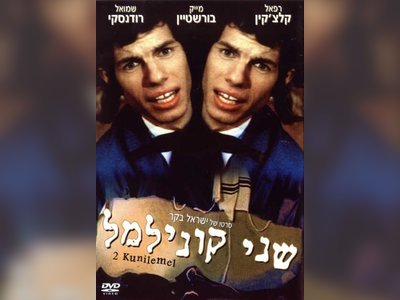"Bouphor" - A Documentary Exploration
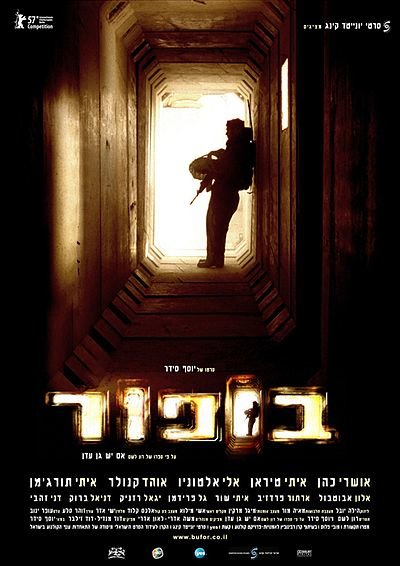
"Bouphor" is a powerful and thought-provoking film that offers a gritty and realistic portrayal of life on the front lines of war. It provides a unique perspective on the experiences of Israeli soldiers during the IDF's presence in Lebanon and raises important questions about the human cost of conflict and the challenges faced by those who serve in the military.
While "Bouphor" may have been overshadowed by "The Counterfeiters" at the Oscars, its impact on Israeli cinema and its portrayal of the harsh realities of warfare have solidified its place in film history. The controversy surrounding its casting and its critical acclaim at international festivals have contributed to its lasting legacy.
"Bouphor" is an Israeli film directed by Yosef Cedar in 2007, based on a screenplay co-written by Cedar and Ron Leshem. The film is based on Leshem's debut novel, "If There Is a Paradise," which won the Sapir Prize for Literature and the Yitzhak Sadeh Prize for Military Literature. "Bouphor" made history as the first Israeli film to be nominated for the Academy Award for Best Foreign Language Film since "Behind the Walls" in 1984.
It garnered recognition at the Berlin Film Festival, winning the Silver Bear award for Best Director and securing four Ophir Awards. It also drew a substantial audience, with around 300,000 viewers in Israel in 2007.
Background:
Set in the last months before the Israel Defense Forces (IDF) withdrawal from the Security Zone in Lebanon, "Bouphor" revolves around the lives of soldiers stationed at the Bouphor outpost. The film delves into their day-to-day existence, the challenges of military routine, interpersonal relationships, and the impending withdrawal itself.
The entire film was shot at the Nimrod Fortress, located at the foot of Mount Hermon, which serves as the visual representation of the Bouphor outpost. To capture the film, a considerable amount of military equipment, including armored vehicles and weaponry, was provided by the IDF. The estimated budget for the film was approximately $2 - $2.5 million, with filming commencing in February 2006.
Controversy:
The casting of three of the main actors, Ohad Knoller, Itay Tiran, and Eli Altonio, who had not served in the IDF or completed their mandatory military service, sparked controversy and public debate. Various civilian and military figures, including then-Chief of Staff Gabi Ashkenazi, boycotted the film, even calling for its ban.
Release and Reception:
"Bouphor" was released in Israel on March 8, 2007, just two weeks after Cedar's victory at the Berlin Film Festival. It shattered opening-week records for Israeli cinema, attracting over 90,000 viewers within its first ten days. During its first two months, the film was seen by approximately 280,000 viewers.
Oscar Nomination:
"Bouphor" faced competition from "The Band's Visit" for the Ophir Award for Best Film in 2007 but was disqualified from the Oscar race for Best Foreign Language Film due to its use of English dialogue. Consequently, "Bouphor" was selected to represent Israel in this category. In January 2008, it was announced as one of the five final nominees for the 80th Academy Awards. However, the film did not win the Oscar, which went to "The Counterfeiters," an Austrian/German film dealing with Jews during the Holocaust.
Plot Summary:
The film's narrative unfolds in the last months of the IDF's presence in the Security Zone in Lebanon. Ziv Farn (Ohad Knoller), a soldier in the bomb disposal unit, is assigned a mission called "Operation Cabinet." His task is to neutralize a Hezbollah explosive device that blocks the route down from the outpost.
Farn parachutes into the outpost amidst rocket attacks, encountering Liraz (Oshri Cohen), the outpost's commander, and Oshri (Eli Altonio), the platoon sergeant. He is later introduced to the other members of the combat unit: Koris (Itay Tiran), the medic, Zitlawi, Nadav the dog handler, Emilio, Baylis, Pavel, and Ruby the snipers.
Liraz, the unit commander, is a stern and demanding officer who imposes discipline on the soldiers stationed on the mountain. Oshri, the platoon sergeant, is a much softer character, a conscript who joined the IDF shortly before his release and tends to calm Liraz during his moments of anger.
The outpost constantly faces relentless rocket attacks from Hezbollah. Each exit from the outpost is accompanied by the call, "Exit, exit," and after an attack, "Casualty, casualty." This routine continues for hours, day after day. At dawn, fog limits visibility, and the outpost is on high alert. The soldiers rotate through various guard positions: the "green," the "red," and so forth.
The soldiers sleep in cramped bunkers with fold-down beds hanging from the ceiling, seeking shelter from the Hezbollah rockets. The outpost itself is built in layers of concrete, expanded over the years, with an underground labyrinth of tunnels, adjacent to the historic Bouphor Fortress. An Israeli flag flutters over the outpost throughout its stay in the Security Zone.
Liraz and his soldiers are tasked with Operation Cabinet. When Ziv approaches the explosive device, it detonates, killing him. The mission is not attempted again, leaving the soldiers, including Liraz, baffled as to why Ziv had to die trying to complete an unnecessary and dangerous mission (the goal was to inspect the device instead of clearing the route with a D9 bulldozer, as is usually done).
Simultaneously, preparations for the IDF withdrawal from Lebanon are underway, and the outpost begins to be stripped of military equipment. Liraz appears reluctant to accept the withdrawal, refusing to authorize the removal of non-essential equipment and even Namerushka, the unit's dog, who is eventually left behind when Nadav the dog handler is transported to Israel.
As Oshri's release date approaches, he takes the soldiers, the "kids" as he calls them, on a tour of the ancient fortress, breaking down in tears as he bids them farewell, two days before the entire unit is set to return to Israel. The following day, the soldiers hear of Zitlawi's death in a news broadcast (a scene using footage from Hezbollah documenting a missile strike on an outpost, which occurred a few months before the withdrawal).
The unit commanders come for a briefing, where Liraz learns that their guard positions are under threat from Nasser guided missiles held by Hezbollah and operated by a Russian sniper. Frustrated by the impending withdrawal and feeling that there is no reason to stay if they descend the mountain, Liraz expresses his concerns.
Khamaisi, the division commander, attempts to reassure Liraz and explains the new policy until the withdrawal: no patrols, remain inside the outpost, fortify the concrete layers around the guard positions, and implement new rules for the guards – don't stay in guard positions due to the danger. In a personal conversation with Liraz, the division commander informs him of the final withdrawal decision.
Liraz joins the guards, and, eventually, so does the rest of the unit. The psychological pressure they've been under begins to take its toll. The next day, Sfisar relieves Liraz from guard duty, but shortly after, a Nasr guided missile strikes the guard position, killing Sfisar.
A truck laden with explosives arrives at the mountain, accompanied by a sapper. The order for the descent, encoded in a message, reaches the outpost, and Liraz ushers his soldiers out. The unit starts dismantling the outpost, and all personal equipment, as well as much of the equipment in the outpost, is transported to Israel in the final convoy, along with the combat support troops.
Only 20 soldiers, including Liraz, are left to man the outpost until the next day when they will all leave on foot. Liraz stations some of his soldiers in the trenches of the ancient fortress, where they find the Hezbollah flag. In the morning, the unit retreats to Israel. The soldiers break into groups and hum together, with the ancient fortress in the background. The film ends with a black screen and a blinking red light representing an impending missile attack.
Themes and Interpretation:
"Bouphor" explores themes such as the toll of war on soldiers' mental health, the futility of conflict, and the bonds formed between soldiers during wartime. The film captures the intense stress and fear experienced by soldiers stationed in a hostile environment, where danger is constant and withdrawal feels both like a relief and a betrayal of their mission.
The character of Liraz embodies the complexities of military leadership and the emotional weight it carries. His struggle to maintain control, his sense of responsibility for his soldiers, and his resistance to the withdrawal order highlight the moral dilemmas faced by commanders in war zones.
The film's use of repetitive and ritualistic elements, such as the calls of "Exit, exit" and "Casualty, casualty," emphasizes the monotony and unpredictability of life in the outpost, creating a sense of claustrophobia and tension.
- בופור (סרט)he.wikipedia.org
